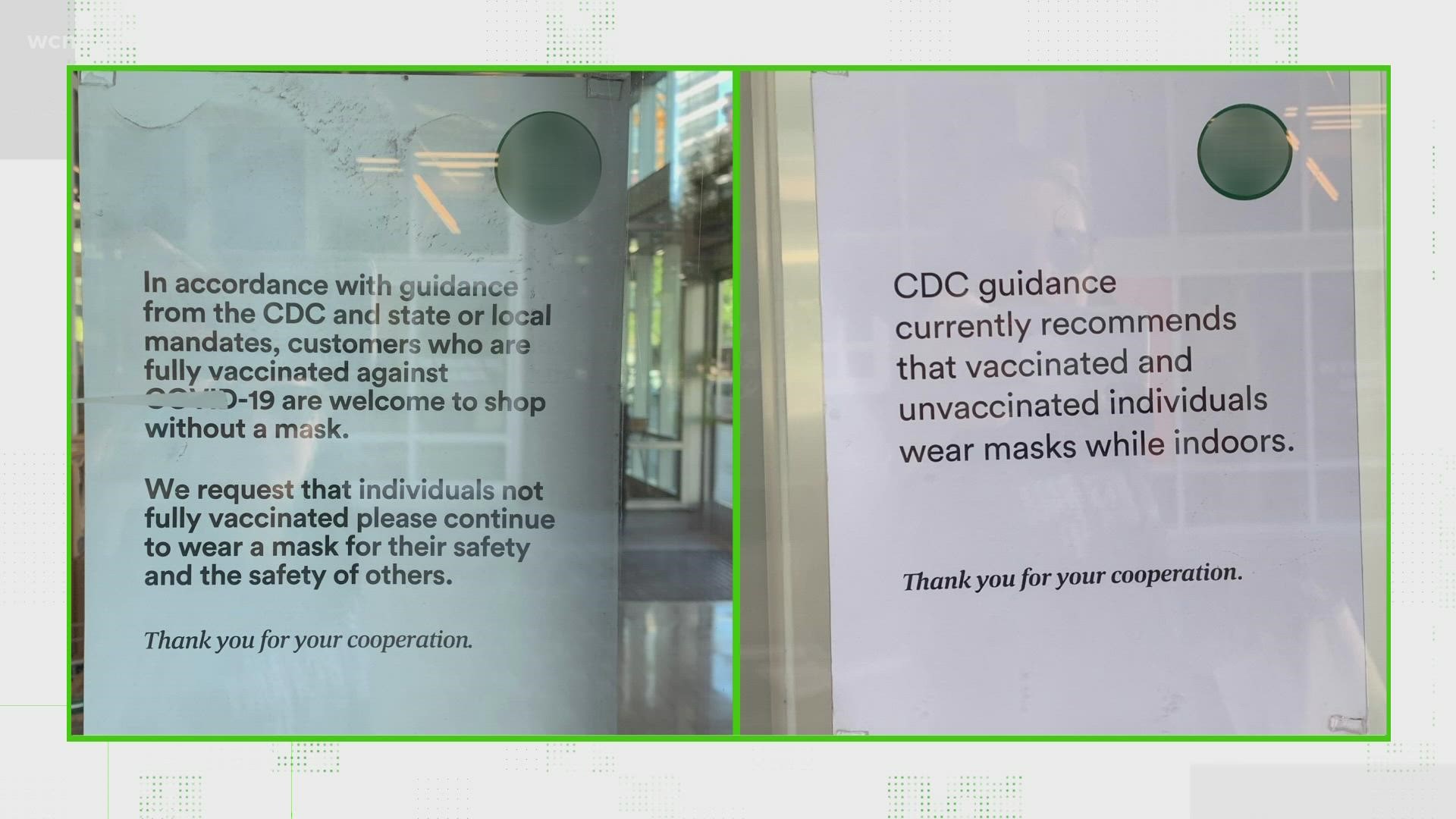CHARLOTTE, N.C. — The COVID-19 surge in the Carolinas appears to be letting up, at least for now. Average daily cases and hospitalizations in North Carolina are down more than 60% from their most recent peaks in early September, but viral transmission is still high across much of the state.
Throughout the pandemic, North Carolinians have seen varying degrees of lockdown and mandated COVID-19 safety protocols. At one point this year, mandatory masking for fully vaccinated people ended. However, with the emergence of the delta coronavirus variant and the corresponding surge, Mecklenburg County decided to reinstate its indoor mask mandate.
Now that October is ending and metrics seem to be improving, many WCNC Charlotte viewers are wondering if the mandate is still in place. Some of the questions are prompted by confusing or conflicting masking signs posted on businesses. Others come from people who are out in the community and are seeing others not masking around them.
The Question
Is the Mecklenburg County mask mandate still in place? If so, how does it end, and who does it impact?
Our Sources
- Dr. Raynard Washington, Deputy Health Director, Mecklenburg County Health
- Mecklenburg County's Board of Health Rule, outlining the mandate
- Centers for Disease Control and Prevention
The Answer
Yes, the Mecklenburg County mask mandate is still in effect, and unlike previous mandates, it is not triggered to end by a specific date. It would end when the county reaches a specific level of viral spread, as measured by certain metrics.
"Yes, the mask mandate is still in effect," Washington said. "It will be in effect until the county reaches a 5% positivity for 30 days."
Positivity rate, in this specific case, would be measured on a daily basis, rather than seven- or 14-day averages. In other words, the county would have to have 30 straight days, where each day saw the percentage of tests finding an infection at or below 5%.
While the county's positivity rate is significantly down from its most recent peak in August, it still hasn't met those requirements.
RELATED: Mecklenburg health officials expected to vote on potential mask mandate policy changes next week
The county mandate also does not allow broad, sweeping exemptions, although there are some exemptions are written into the rule.
"There are no exceptions for vaccination status," Washington said. "There were under previous recommendations, but not this public health rule."
While fully vaccinated North Carolinians were exempt from mandatory masking under most circumstances earlier this year, the highly contagious delta variant is the reason fully vaccinated people must mask indoors again. According to CDC guidance, that is because some vaccinated people with a delta breakthrough case could be contagious, although it is likely for a shorter period of time than someone who is unvaccinated.
The rule outlines the specific mask-exempt scenarios:
"Face Coverings do not need to be worn by someone who:
(1) Should not wear a Face Covering due to any medical or behavioral condition or disability (including, but not limited to, any person who has trouble breathing, or is unconscious or incapacitated, or is otherwise unable to put on or remove the Face Covering without assistance);
(2) Is under five (5) years of age;
(3) Is actively eating or drinking;
(4) Is seeking to communicate with someone who is hearing-impaired in a way that requires the mouth to be visible;
(5) Is giving a speech or performance for a broadcast, or to an audience, where they maintain a distance of at least 20 feet from the audience;
(6) Is working at home or is in a personal vehicle;
(7) Is temporarily removing their Face Covering for identification purposes to secure government or medical services;
(8) Would be at risk from wearing a Face Covering at work, as determined by local, state, or federal regulations or workplace safety guidelines;
(9) Has found that their Face Covering is impeding visibility to operate equipment or a vehicle;
(10) Is a child whose parent, guardian, or responsible person has been unable to place the Face Covering safely on the child's face;
(11) Is alone in an enclosed space, such as a room, office or vehicle; or
(12) Is in settings where it is not practical or feasible to wear a Face Covering, including when obtaining or rendering goods or services, such as the receipt of dental services or while swimming."

